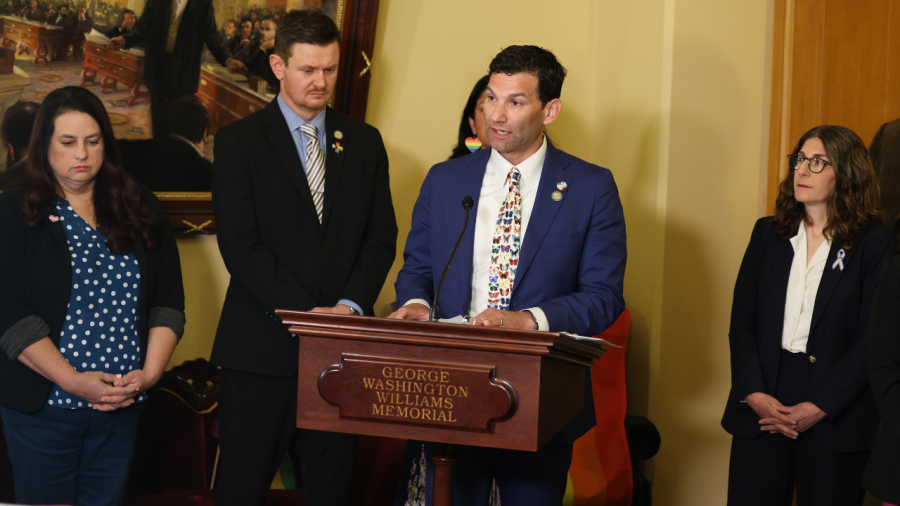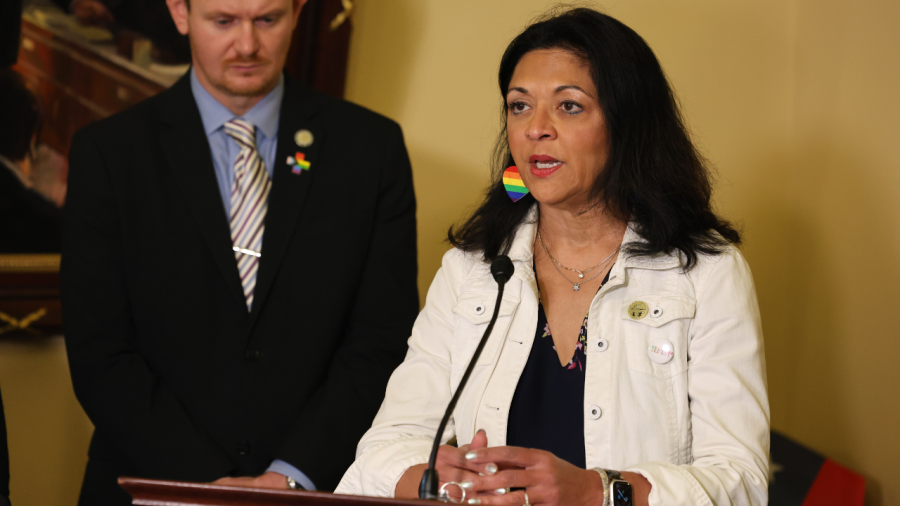COLUMBUS, Ohio (WCMH) — Lawmakers are igniting plans for Ohioans to vote in 2026 on whether to repeal the state’s dormant same-sex marriage ban, out of concern it could be reenacted if the U.S. Supreme Court overturns marriage equality.
Reps. Anita Somani (D-Dublin) and Eric Synenberg (D-Beachwood) announced on Tuesday that they are reintroducing the “Marriage Equality Act,” a House Joint Resolution to codify same-sex and interracial marriage. If passed by the Statehouse, the act would place a constitutional amendment on the November 2026 ballot, providing Ohioans the chance to enshrine marriage equality into Ohio’s constitution.
LGBTQ+ advocates argue the effort is needed given the Supreme Court has signaled it might reassess Obergefell v. Hodges, the 2015 case legalizing same-sex marriage. In a concurring opinion to the June 2022 ruling overturning Roe v. Wade, Justice Clarence Thomas wrote justices “should reconsider all of this court’s substantive due process precedents, including … Obergefell.”
Dwayne Steward, Equality Ohio executive director, shares those concerns and told NBC4 in March that the organization is “having conversations across the state around how we protect marriage equality” in the wake of resolutions introduced in a handful of states urging the Supreme Court to roll back Obergefell.
Legislators also attempted last year to align Ohio law with the protections set by Obergefell, but the proposal didn’t advance past a single committee hearing. Watch a previous NBC4 report on the “Marriage Equality Act” in the video player above.
“We cannot assume that federal protections currently under law will last forever, and that is why we are taking this step now to ensure that Ohio’s constitution reflects what we already know to be true: Love is love, families matter and every Ohioans deserves equal protection and dignity under the law,” Synenberg said on Tuesday.
Should Obergefell be overturned, Ohio would reckon with a revived law passed by the Statehouse in 2004 that states “a marriage may only be entered into by one man and one woman.” A constitutional amendment that voters passed later in 2004 which reads, “only a union between one man and one woman may be a marriage valid in or recognized by this state,” would also be resurrected.
A federal law signed in 2022, the Respect for Marriage Act, requires a state to recognize same-sex marriages from other states, while also allowing states to decide for themselves whether to issue licenses to same-sex couples. So, if Obergefell falls and Ohio’s bans have yet to be repealed, the act would only require the state to recognize marriages from other states where it is legal.
The “Marriage Equality Act” would ensure Ohio’s same-sex couples can continue utilizing legal privileges associated with marriage, like sharing insurance, accessing military benefits, and tax deductions associated with filing taxes jointly. As an OBGYN, Somani said she’s “seen firsthand how having a legally recognized marriage is incredibly important during life’s most difficult and vulnerable moments.”
“We see this when someone is dying of cancer and their partner is not allowed to be there in hospice or end-of-life care,” Somani said. “That is devastating to not have that recognition when you spent your whole life with someone. I have so many friends and family members who are so scared they are gonna lose their legal marriage rights, and I think we need to be fighting.”
A ballot measure in Ohio codifying marriage equality would not be unprecedented. Also concerned after the fall of Roe in 2022, voters in California, Colorado and Hawaii passed initiatives in last November’s election to repeal dormant same-sex marriage bans and proactively protect marriage equality. Ohio’s version would follow in the footsteps of 2023’s Issue 1, another ballot measure that passed with 56% of the vote and established the right to abortion.
Somani and Synenberg made Tuesday’s announcement during a press conference marking Pride Month with other Statehouse Democrats and LGBTQ+ advocates. Sen. Nickie Antonio (D-Lakewood), Ohio’s first openly gay Statehouse lawmaker, touted her new bill to mark “Love Makes a Family Week,” after Republican legislators introduced plans to designate a month celebrating “natural families.”
Antonio also recently reintroduced proposals to ban anti-LGBTQ+ conversion therapy and discrimination against the LGBTQ+ community. While Antonio told NBC4 in March the timing of a measure codifying same-sex marriage needs to be right and that such a proposal would only be written “honestly and presented objectively” when Statehouse representation changes, she said on Tuesday now is the time to “stand together to make sure that no one is sent out to the margins.”
“I am proud to be the first member of the LGBTQ community to be elected to this legislature back in 2010,” Antonio said during the press conference. “There is no closet big enough to send us all back to, we’re not going and we don’t have to. We should not. Members of the LGBTQ community survived persecution, survived erasure a long time ago. We are not going back to those days.”












